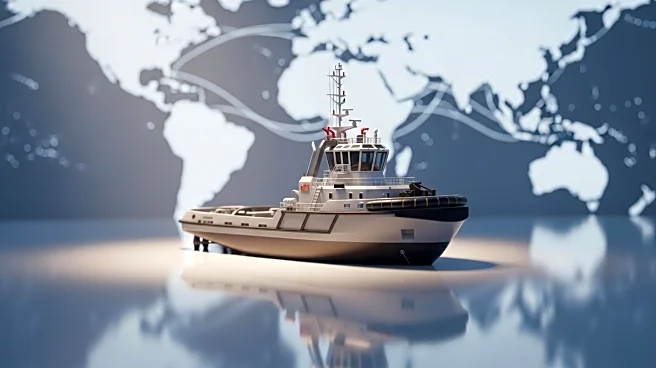What's Happening?
The Israel Ports Company, in collaboration with the Ministry of Transport, has redirected an order for two technologically advanced tugboats to a Bulgarian shipyard. This decision follows Turkey's recent expansion of its trade ban against Israel, which includes prohibiting Israeli ships from Turkish ports and closing its airspace to Israeli military cargo. The tugboat order, valued at $30 million, was initially placed with a Turkish shipbuilder but has now been moved to MTG Dolphin shipyard in Varna, Bulgaria. The new tugboats, featuring Rotor tug technology and a pulling capacity of 85 tons, are expected to be delivered by the end of 2026. This move is part of Israel's strategy to enhance its maritime capabilities and maintain operational independence.
Why It's Important?
The shift in the tugboat order underscores the escalating tensions between Turkey and Israel, impacting trade relations and maritime operations. Turkey has been a significant trading partner for Israel, with exports exceeding $5.3 billion in 2023. The trade ban could disrupt the flow of goods and affect industries reliant on Turkish materials, such as construction. By moving the order to Bulgaria, Israel aims to mitigate the impact of the ban and ensure the continuity of its port operations. This decision reflects Israel's commitment to maintaining its maritime infrastructure and adapting to geopolitical challenges.
What's Next?
Israel's decision to move the tugboat order to Bulgaria may prompt further diplomatic and economic responses from Turkey. The ongoing trade restrictions could lead to increased tensions and necessitate alternative trade routes and partners for Israel. Additionally, the delivery of the new tugboats will enhance Israel's maritime capabilities, potentially influencing future port operations and trade strategies. Stakeholders in the maritime industry and government may need to reassess their strategies in light of these developments.
Beyond the Headlines
The trade ban and subsequent shift in the tugboat order highlight broader geopolitical dynamics in the region. The situation raises questions about the long-term implications for regional trade partnerships and the potential for further diplomatic conflicts. The decision also reflects Israel's strategic approach to maintaining its maritime independence and technological advancement in the face of external pressures.











